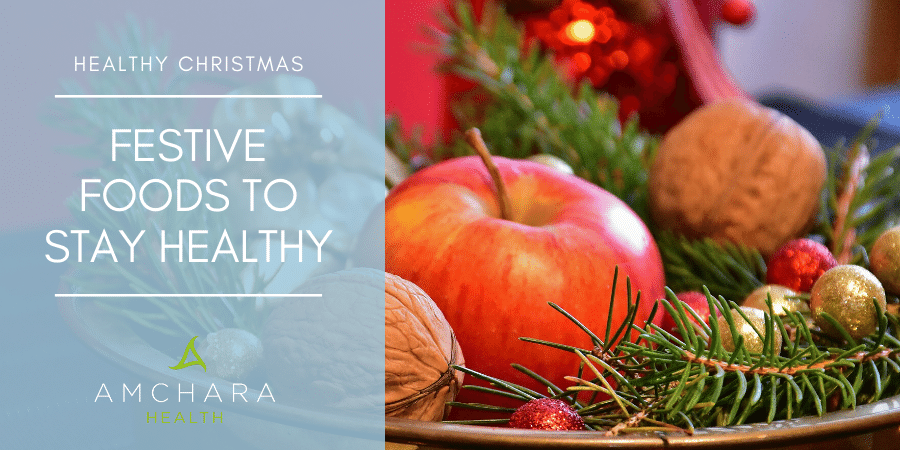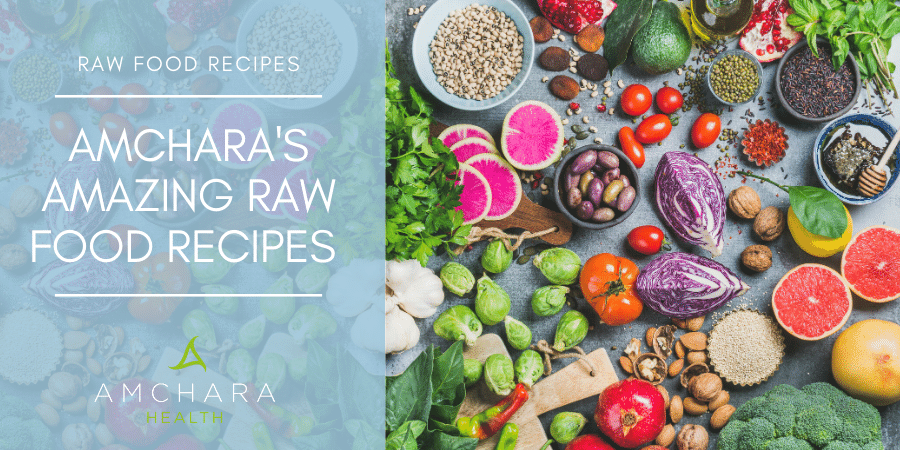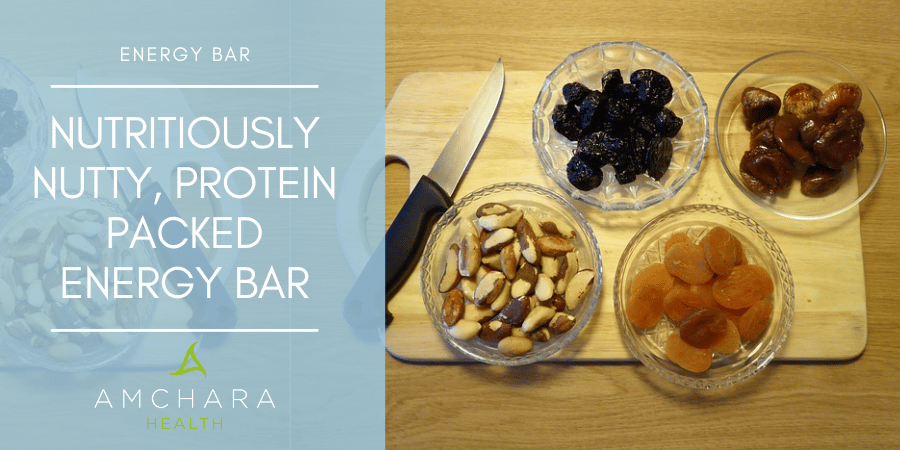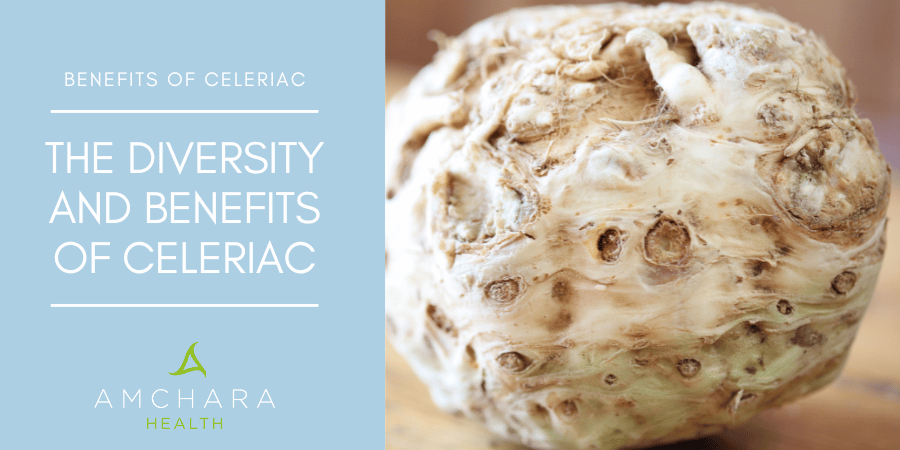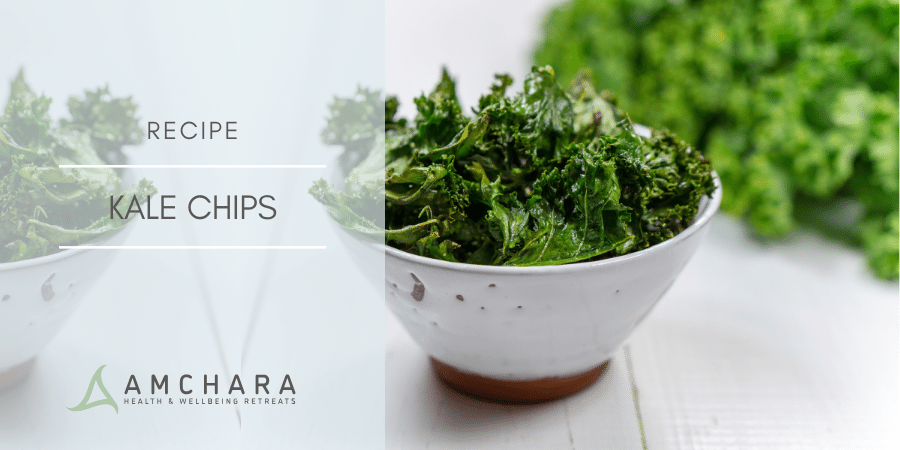Table of Contents:
The Christmas period is a time when it’s customary to eat, drink and be merry.
Tempting treats are everywhere, and a little of what you fancy is one of the joys of the season.
It is difficult to make healthy food choices when surrounded by sweet treats and processed indulgences, but at this time of the year, with coughs and colds passed around like parcels and late nights, family commitments and money concerns often putting us under extra stress and pressure, we need good nutrition more than ever.
With this in mind, we thought we’d take this opportunity to share our suggestions for some nutritious foods to enjoy over the Christmas and New Year period.
Nutrition through the festive season
Vitamin C, crucial for maintaining a healthy immune system, is used up faster when we are under stress or if we’re fighting off an infection. This vitamin cannot be stored in the body so we need a constant supply.
At the same time, our stress glands need plenty of B complex vitamins if we’re constantly on the go. If magnesium becomes depleted, we can find it hard to relax and drop off to sleep.
Yet it’s precisely at these times we tend to reach for convenience foods which are depleted of nutrients as well as being laden with sugar and salt. We often make different food choices to those we usually make, we prop up our energy levels with caffeine, we may drink more alcohol than usual and may even feel pressurised to eat just one more sweet treat by well-meaning family and friends.
Let’s discover how to navigate our way through the festive munchies, have a wonderful time yet still be kind to our body by providing it with quality nutrition.
Healthy festivities
When planning for good health over Christmas, firstly be realistic. Don’t under any circumstance beat yourself up if you snack on one too many sausage rolls or extra mince pies. Instead, plan to eat more delicious and healthy plant-based foods the following day.
This way, you can switch your negative thoughts about food to positive ones. Above all, enjoy those times when you eat treats, but balance indulgent foods with healthy ones.
Start with a nutritious breakfast
Even if it all goes downhill from there, a healthy breakfast means you know you’ve packed some great nutrition into the start of your day. An omelette, packed with any veggies you can find in your fridge, is a great option as it contains protein to sustain your energy levels throughout the day.
Warm porridge sprinkled with seeds and berries is irresistible on a cold morning. Or how about buckwheat pancakes with berries? All berries are packed with antioxidants, which help protect our cells from damage. Splash out and include blueberries, gooseberries, strawberries and raspberries.
If you’re short on time, a green smoothie can be whizzed up in seconds. Include some organic spinach or kale, berries and a protein source such as yogurt or silken tofu for breakfast on the run.
Stay hydrated
In colder weather it’s easy to forget to drink liquid. If you indulge in a tipple come evening your body will thank you if you keep your fluid intake up. Alternate alcoholic drinks with a large glass of water, still or sparkling, with a twist of lemon or lime.
During the day, keep a glass of water nearby to sip and don’t forget warming herbal teas including chamomile to help you relax and ginger to combat inflammation.
Buffet wisdom
If we’re socialising and eating, it’s easy to choose food we wouldn’t normally eat – and we’ll often also eat more than we usually do. Make a beeline for any vegetables such as crudités or salad and fill half your plate with these to begin with. Then choose some protein options such as smoked salmon or chicken.
When you’ve selected your food, move away from the buffet and sit down if possible. Not only will you then tend to eat more slowly and mindfully, but you won’t be as tempted to graze on the crisps and salted nuts.
Christmas dinner magic
When the big day arrives, the great thing about Christmas dinner is it’s a wonderful excuse to pile your plate high with healthy vegetables. Remember, non-starchy vegetables (so not including potatoes, even sweet potatoes, or parsnips) should cover at least half of your dinner plate.
The protein part of your meal – traditionally turkey, a vegetarian nut roast or some wild-caught salmon, rich in immune-boosting Omega 3 – should cover a further quarter of your plate. The starchy vegetables like your roasties and parsnips make up the final quarter.
-
Festive vegetable fun
Plan to include a wide variety of your favourite vegetables with Christmas lunch, and make enough for second portions. You can always use any leftovers for breakfast on Boxing Day, made into a vegetable scramble, bubble and squeak or vegetable potato rosti.
Green leafy vegetables are a great choice, as they are brimming with vitamins, minerals and antioxidants to keep your cells young and healthy. As if this wasn’t enough they contain valuable plant fibre which provide food for our beneficial gut bacteria. Healthy gut bacteria are important not simply for good digestive health but also for the functioning of our immune system, weight management and even our mood and brain function. It’s therefore vital we keep them happy!
The bugs residing in our digestive system tend to take a hammering over the festive season as they don’t thrive when we’re eating sugary foods, drinking alcohol and they’re even known to be adversely affected by stress and sleepless nights.
Choose from kale, savoy cabbage, spinach, broccoli, and asparagus, which are high in vitamins A, C, K and folate, as well as magnesium, iron and calcium and plenty of antioxidants.
It’s a pity we often restrict Brussels sprouts to Christmas, because they’re packed with nutrients, being particularly high in vitamins C and K. They also contain antioxidants such as kaempferol which has been linked to decreased inflammation and improved heart health.
Incidentally, the reason why some people adore Brussels sprouts while other people loathe them is thought to be down to inherited genetic differences in how we taste a bitter substance contained in them.
Broccoli is a superstar vegetable, being a member of the cruciferous vegetable family, a distinction it shares with kale, cabbage and cauliflower. This family of vegetables contain a number of plant chemicals which may help the liver to detoxify harmful substances.
The best way to cook green leafy vegetables is to steam them lightly. This way your vegetables will retain more of their precious nutrients. Boiling vegetables means many of their minerals are lost in the cooking liquid. To offset this boil for the minimum time only and use any water from boiling or steaming vegetables to make your gravy.
One brilliant member of the cruciferous vegetable family is cauliflower. Roasted cauliflower is simple and delicious – why not pop some cauliflower in the oven while you’re roasting the potatoes?
For a splash of orange on your Christmas dinner plate don’t forget the carrots. Carrots contain a good amount of beta-carotene which the body uses to manufacture vitamin A. This vitamin is essential for healthy eyesight, while beta-carotene is also an antioxidant in its own right.
Or how about adding some ruby red colour to your plate with some slow-cooked red cabbage with apples and spices? Red cabbage is packed with antioxidants known as anthocyanins, which have been linked with heart, eye and brain health as well as improved memory and reduced cholesterol levels (1).
Moving on to starchy vegetables, who can resist roasted spuds? The humble potato is a source of nutrients such as potassium and vitamin C, especially if you leave the skin on. Better still, try roasted sweet potato this year – their beautiful colour tells you they are rich in antioxidants, especially beta carotene.
Don’t roast your potatoes in a polyunsaturated oil such as sunflower oil because these oils break down when they’re heated. Try coconut oil which apart from being stable under heat has a host of healthy properties of its own such as its contribution to healthy cholesterol levels.
Parsnips are another essential on your Christmas dinner plate, not simply because they’re tasty but they’re also packed with nutrients like vitamin C, K and folate. Roast them with a little coconut oil and add a splash of apple juice and cinnamon for a Christmas flavour.
-
Gorgeous gravy
Why not make a red onion gravy to enjoy with Christmas dinner this year? Red onion is packed with antioxidants including quercetin, which is known to be a natural antihistamine. Red onions also contain a special type of fibre known as a prebiotic which helps to feed those bacteria resident in your gut.
Adding extra garlic to your gravy is not only delicious but it can help your liver’s detoxification enzymes, because it’s a great source of sulphur compounds. Garlic has been used medicinally for thousands of years and has been studied in relation to its benefits to cardiovascular health, blood pressure maintenance and managing cholesterol levels. Garlic also possesses antimicrobial properties, so many people use it to help avoid colds and flu.
-
Turkey – not just for Christmas?
Many people only eat turkey once a year, which is a shame because it’s a great source of protein, B vitamins, selenium and zinc. However, all turkey is not equal. Organic free-range turkey, especially if it’s pasture or herb fed, although more expensive, will contain a higher level of nutrients including essential fats, and they also taste better.
Pep up your stuffing by replacing breadcrumbs with quinoa or wild rice, add some pureed pumpkin or squash so it holds together and use dried apricots plus fresh nuts and seeds for crunch.
Don’t be shy about the cranberry sauce. These little berries are packed with antioxidants, and their juice has been traditionally used to combat urinary tract infections. Because cranberries are tart, cranberry sauce needs to be sweetened to make it palatable. It’s easy to make your own using honey and orange juice to add sweetness instead of buying a commercially made sauce which will be loaded with added sugar.
A healthy helping hand
We hope these healthy tips have inspired you to enjoy a nutritious festive season, but if you feel you’d like a little extra support in making healthy lifestyle and nutritional choices in the New Year, why not consider a consultation with a Personalised Health practitioner? Healthy habits, once learnt, can pave the way to improved wellbeing throughout the year.
Here’s to a happy and healthy Christmas.
We believe sharing knowledge and experience is an important part of achieving optimal health and would love to hear your views and experiences.
Do you have any favourite healthy Christmas food favourites?
We’d love it if you shared them in the comments.
Read this next:
